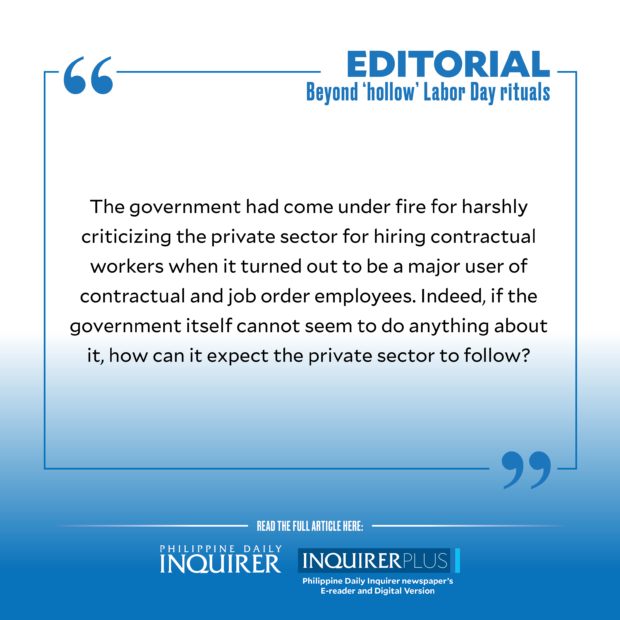Beyond ‘hollow’ Labor Day rituals

Some 832,812 public workers on contracts of service (COS) and job orders (JO) got an early Christmas gift after President Marcos last week ordered government agencies to extend their contracts that were supposed to expire on Dec. 31 this year to 2025.
But the relief over getting their contracts and job orders extended by another year will have to be short-lived as there is no assurance that they will get another extension, which means they may eventually be forced to join the ranks of the unemployed.
As Annie Geron, president of the Public Services Labor Independent Confederation, pointed out: “Extending the deadline in the engagement of individual contract of service and job order workers does not address the worsening contractualization in the public sector.”
She said: “They will continue to live in fear of losing their jobs and failing to support their families. They will continue to be paid subpar wages and excluded from mandatory benefits and social protection.”
Short-term contracts
Among the top national government agencies with the most contractual and job order workers are the Department of Public Works and Highways with 29,275, Department of Health (18,264), Department of Education (15,143), Department of Social Welfare and Development (13,770), and Department of Environment and Natural Resources (10,990).
The government had come under fire for harshly criticizing the private sector for hiring contractual workers when it turned out to be a major user of contractual and job order employees. This, Geron noted, was no different from the end-of-service or “endo” arrangements in the private sector where workers’ contracts are given short-term contracts that are periodically extended to avoid making them regular employees who are entitled to better compensation and benefits.
Indeed, according to the Presidential Communications Office, up to 29.7 percent or 832,812 of the total government workforce, meaning about one in every three government workers are either COS or JO workers.
In a 2017 joint circular, the new rules governing the hiring of contractual workers until Dec. 31, 2018, were issued by the Civil Service Commission (CSC), Commission on Audit, and the Department of Budget and Management. The contracts, however, were extended to 2020, 2022, 2024, and now to 2025.
‘Number one endo violator’
As a result, Geron said contractual workers have ballooned to 832,812 as of June 30, 2023, based on the CSC Inventory of Government Human Resources, from 648,215 in 2022 when Alliance of Concerned Teachers party list Rep. France Castro first called out the excessive and growing number of such workers in government.
No surprise therefore that despite a Duterte-era executive order banning illegal contracting or subcontracting, the widely criticized practice continues to prevail. Indeed, if the government itself cannot seem to do anything about it, how can it expect the private sector to follow?
Back in 2018, Sen. Francis Escudero already called the government the “number one endo violator,” as it had the most number of contractual and job order workers at both the national and local levels.
Part of the problem was that those with job contracts were not civil service eligible, thus Mr. Marcos is on the right track for ordering government agencies to provide training and re-education opportunities to COS and JO employees, in partnership with colleges and universities, to help them hurdle Civil Service examinations.
With this scheme, the government can build a pool of government workers who are qualified to occupy plantilla positions, the President said.
Constructive dialogue
And while the President’s directive addresses the situation of workers in the public sector, today’s Labor Day celebration is an occasion for Mr. Marcos to consider the welfare of the rest of the workers toiling to keep the economy running.
Nagkaisa labor coalition chair and Federation of Free Workers president Sonny Matula said that they had submitted repeated requests to hold a meeting with the President since he took office two years ago but they have yet to receive any response.
“The lack of dialogue with the President has been a concerning pattern that can no longer be overlooked. As we observe Labor Day, it is paramount that [our] significant concerns are addressed directly with President Marcos to ensure the effective representation and advancement of workers’ rights and welfare,” Matula said.
The President would do well to engage in a constructive dialogue with the different labor groups on issues ranging from wage increases to job security and freedom of association, and craft policies that would alleviate their plight.
This way, he can ensure that Labor Day under his watch would be more than just a “hollow ritual” but a consequential one where real changes are made to benefit workers.




















